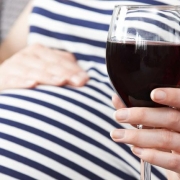Paternal Alcohol Use Increases Frequency Of Fetal Development Issues
Prenatal visits have traditionally focused almost exclusively on the behavior of mothers, but new research from the Texas A&M University College of Veterinary Medicine & Biomedical Sciences (CVMBS) continues to suggest that science should be looking more closely at the behavior of fathers as well.
Publication in The FASEB Journal , Golding’s team showed that the epigenetic factor of prenatal exposure to alcohol in males can manifest in the placenta.
According to Kara Thomas, VTPP graduate student and the lead author on the paper, their data shows that in mice, offspring of fathers exposed to alcohol have a number of placenta-related difficulties, including increased fetal growth restriction, enlarged placentas, and decreased placental efficiency.
“The placenta supplies nutrients to the growing fetus, so fetal growth restriction can be attributed to a less efficient placenta. This is why placental efficiency is such an important metric; it tells us how many grams of fetus are produced per gram of placenta,” Thomas said. “With paternal alcohol exposure, placentas become overgrown as they try to compensate for their inefficiency in delivering nutrients to the fetus.”
Release date: 01 February 2022
Source: Texas A&M University







